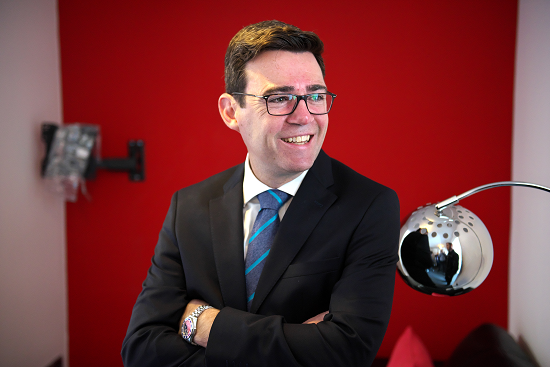Photo courtesy of GMCA
Stand at the urinals of Salford experimental music venue The White Hotel, and your eyes will immediately meet the words ‘ANDY BURNHAM IS A POWER BOTTOM’, scrawled in thick black pen on the pale walls. This irreverent graffito tribute, which has endured for a couple of years now, speaks to Burnham’s unique status as that rarest of things in the United Kingdom – a politician received with some level of benevolence.
On a warm summer evening last year, I watched Burnham walk the stretch of pavement from the Temple pub beer garden to the Peveril of the Peak, greeted consistently and without exception by the cheers and good wishes one would far more commonly associate with one of Manchester’s legacy musicians. How did we get here?
Born in 1970 in the Merseyside suburb of Aintree to a telephone engineer and receptionist parents, Andrew Murray Burnham was the bright Liverpool boy come good. He studied English at Fitzwilliam College, Cambridge, where he met Marie-France van Heel to whom he is still married, with three children. A member of the Labour party since the age of 14, his graduation timed harmoniously with the coming New Labour dawn. By 27, Burnham was hired in the first of a series of advisor positions in the first New Labour government, even playing as a “very physical” centre-forward in the Demon Eyes FC football team of party insiders (David Miliband, Ed Balls, Dan Hodges.) Things could only get better. Burnham was hotly tipped throughout the 2000s, forming the junior part of a forgotten political joint ticket with the minister James Purnell, but remained the nearly-man of Labour politics.
During the 2010 Labour leadership contest, he was eliminated in the first round with just 8.7 per cent of the vote. He spent the next few years showing leg to the left of the party. I remember sitting in a chilly north Manchester sports hall during the Miliband years, watching Burnham confidently and fluently explain a policy that had sounded like garbled politico speak coming from the mouth of his boss a few minutes earlier. Surely the next leadership election would be a dead cert? Burnham certainly thought so. Misjudging the mood of the party – or perhaps so certain that he would win that he could afford to speak to country, rather than party – Burnham launched his leadership campaign at a bank and failed to oppose to David Cameron’s welfare bill, which created the political space for Jeremy Corbyn’s outsider leadership campaign to flourish. More than this, his salt of the Earth credentials felt a little overseasoned – asked by Mumset contributors to name his favourite biscuit during that leadership election, he responded with “beer, chips and gravy.” He came a yawning second with just 19.0 per cent of the vote.
A truth of art, life and politics is that the experience of failure so often sews the seeds of future success. Burnham’s public humbling helped him, he visibly eased up, his thick eyelashes fluttered with less sense of entitlement. His campaigning for Hillsborough victims won him begrudging respect – he was played sympathetically by the actor Matthew McNulty in the recent ITV drama Anne. Standing for the inaugural Manchester Mayoral election in 2017, Burnham won an impressive 63.4 per cent. The region is a Labour stronghold, but Burnham was able to win even in staunchly blue wards. His pragmatic, soft-left regional populism – splitting the difference between Wilsons Harold and Tony – chimed with the demands of the pandemic. As Manchester Mayor, Burnham has made music central to his appeal. He is regularly seen at gigs. He livestreamed a DJ set to raise money for Manchester venues during the pandemic. City music grandees speak warmly of Burnham’s engagement with them, and his instigation of a Greater Manchester Music Commission.
Picking thirteen albums for this interview was, Burnham explains over the phone on a wet Manchester Monday afternoon, “really hard, not because it’s a lot but because it’s just so few.”
“A disclaimer” he adds, “these are not necessarily my favorite thirteen albums, but instead these are the ones that had an impact on my life or were significant moments in my life. I tried to use that as my guiding…” he searches for a word, “thing.”
Andy Burnham is the Mayor of Greater Manchester. To begin reading his Baker’s Dozen, click the image of him below


